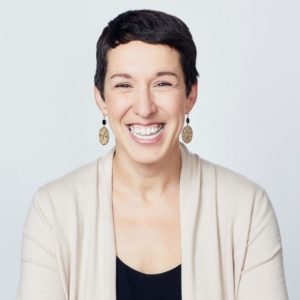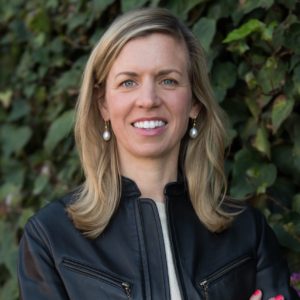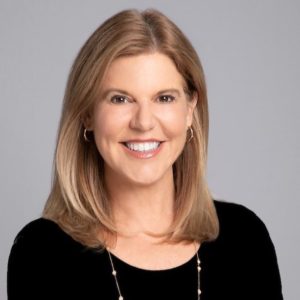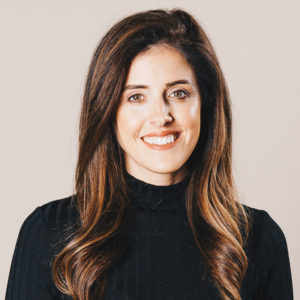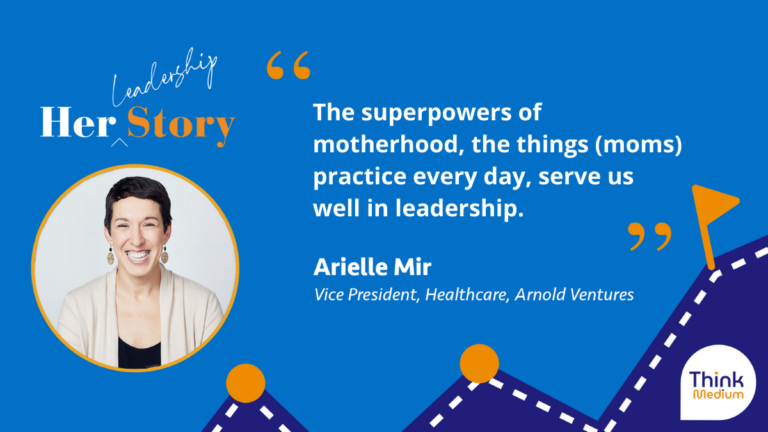Sanjula Jain 0:20
Executive Mom’s face many challenges as they navigate both their careers and families. Not only do these Mom’s juggle physical and emotional responsibilities, but they also deal with public perceptions towards juggling both a career and motherhood. In this part II of our executive mom series, we’ve asked a few of our guests discuss these challenges and share what solutions have worked well for them. First, we hear from Arielle Mir, Vice President of Health Care (Complex Care), Arnold Ventures.
Arielle Mir 0:37
Earlier in my career, I had this idea that, to be an effective leader, you had to be present in the office at all times and be the last person to leave and the person to know all of the information and have your hands in all of the pots. Of course, when you become a parent, it becomes much more difficult to play that game. It cost me to see and grow into a leadership posture of cultivating a great network around me, trust in the people around me, clarity in the roles I play and my team play, and to interrogate what is enough and what it means to get the job done and get the job done well and to understand what we’re trying to drive to. The quantity and the quality don’t necessarily correlate. I read a book when my older son was about two and starting to assert his opinions. It’s a book called How to Listen So Kids Will Talk and Talk So Kids Will Listen. They gave these techniques for, again, this active listening and reflecting back what you heard. When a kid says, “Cookie!” Instead of saying, “Oh, it’s dinner time, honey. We’re not having a cookie,” say, “I hear that you want a cookie. Cookies are really delicious,” to make them feel heard. Don’t you know, that is a good technique in the workplace. When someone comes to you with a strongly held position in any working relationship, that kind of skill is really, really valuable. I would never say to my colleagues, “I’m treating you like my toddler son,” but those superpowers and motherhood, the kinds of things that you have to practice every day as you’re holding the space for another human being to be learning and growing and establishing their own place in the world, serves you well in leadership.
Sanjula Jain 3:20
Next is Kelsey Mellard, Founder & CEO of Sitka. She discusses her having to reveal her pregnancy while fundraising.
Kelsey Mellard 3:26
We’re really excited to be welcoming a little one in September for our first addition to our family outside, of course, our fur baby, our Spanish water dog. That time of being six weeks pregnant and closing a series A and that weird window where no one really tells anyone yet and you’re feeling things out, like what’s going to happen? I was continuing to progress in the pregnancy positively and feeling like, “I have to tell Bob and Ryan that this other thing is coming.” Of course, it probably felt like a bigger deal to me than it did them. And so I was 10 weeks pregnant. And during one of our check ins, like shared the news with them and said there is something that I I want you to know that is really important, and we will navigate through it. But I do want you to know this, as soon as I think I’ve probably told them before I told my family in some ways, because I take that relationship incredibly seriously. And they’ve invested a lot of time and energy and effort and continue to do so of course not to mention money into Sitka. And so I don’t know what maternity leave will look like. Frankly, this is entering a new world where I won’t have tremendous amount of control as to what happens and how the delivery goes and what the baby’s needs are after what my needs are after. And we’re in the process of starting to think about Plan A versus Plan B. But I’ll tell you, it’s been really challenging when I’ve been kind of googling around like founder CEO maternity leave, there’s a couple instances, right, I think we dive with the Bumble IPO and that CEO having her child as part of that experience, which is really beautiful. There’s a few cases like that, that that exist and experiences that exist. But it’s something that there’s not a cookie cutter approach to it. And this is kind of create your own adventure. And we’ll be doing that in conjunction of course with luckily some families support that we’re really fortunate enough who who are eager to come out and help and and then of course, we’ve been spending a fair amount of time building our team at Sitka and feeling really positive about the folks that we’ve been able to welcome to help us get to the next level of organization. And frankly, stability. And I do think this is kind of a test to just broader organizational design, which is on maternity leave is not unique. And we as a country still treat it as a pretty unique thing, because we’re not used to it occurring all that frequently in our workplaces. Same with paternity leave. And baby bonding is actually what what it’s referred to as these days. But if you do a good job building your organization and you’re of certain size, right, there should be enough infrastructure, hopefully in place to keep things pretty afloat. But there’s a couple of variations of plans that we have a couple of weeks off to needing more time and how to go completely off versus part time and what that looks like. So we’re starting to toy around with some of those models. And luckily, for my husband’s work, place zooks was acquired by Amazon earlier this year has generous baby bonding time as well. So we’ll certainly be taking advantage of that.
Sanjula Jain 7:13
Dr. Amy Compton Phillips, President of Clinical Care for Providence St. Joseph Health, explains having to making certain choices while raising two children.
Amy Compton Phillips 7:19
I started out as a frontline clinician, and then I ended up being a department chief of internal medicine. Then I was asked to run medical offices. Around that same time, I had my second child and I was finding juggling the clinical care, the administrative responsibilities, and raising two kids with a husband who had a busy job overwhelming. I said, “I have to give up something. What is the thing that I’m willing to give up?” I decided I was willing to give up administrative tasks and I went back to halftime work, just seeing patients. When you work half time, that’s two and a half days a week. You actually work three days a week, so I finally said, “Hey, will you pay me for the other half day?” Then they said, “Well, would you do a little bit of administrative work in the meantime?” I ended up doing it and it kept creeping back up. I finally got to four days a week and started taking on more administrative tasks. Around the same time, I took a bigger job that I had cut back. It is an iterative process.
I feel incredibly lucky. So probably what’s been my most difficult doesn’t even remotely compare to colleagues of mine who have been raising children with one parent, for example. I have two and I happen to have a marriage that’s less than 31 years now. We actually still really like each other, each other as friends. So the difficulties that I faced are probably significantly different than difficulties other have faced, but part of it’s been how do we balance out what’s important. So when I was younger, my husband’s career was the one that we thought was going to be the one that helped set our finances into the future because we both grew up with families that well, their moms were teachers and our dads both worked because that’s what it took to raise a family. We didn’t really have any money. That said we wanted a better life for our kids. So my husband’s job, his job was going to be the one that fun. So I went halftime and he went to work and I was the more parenting later when I got the job nationally. He cut back to halftime; I went on to do the full job. But those kinds of decisions are how do we do that together? How do we figure out? How do we focus on the kids and we focus on the jobs? Our answer was one of us has to work a little bit less because two super busy jobs is incompatible for our family with putting the time into the children that we wanted to. It’s such a juggle and the lesson that we learned is saying yes to everything means doing everything badly, that in order for us to do anything well, we had to learn how to say no to some things. My biggest take home is be willing to say no and your life will be better.
Sanjula Jain 10:28
Next is Halle Tecco, Founder & Chief Women’s Health Officer of Natalist. She describes how becoming a parent helped her to set boundaries.
Halle Tecco 10:35
I made a promise to myself and my family that I wouldn’t, you know, they would set boundaries, and there’s no easier way to set boundaries than to become a parent, because you could you can put the gym aside, but you cannot put a baby aside. And so I really do I, you know, we’ve created a culture and natalist team is mostly moms. So we’ve all we’re all in the same boat. And, you know, we we literally pop off at five, we all, you know, turn off Slack, turn off all notifications, we don’t work weekends, and we’re all really committed to not burning out and creating a really good work life balance. That also means being extremely productive during the work hours, I don’t think I realized how unproductive I was before I might have been working 80 hour weeks, but I was spending a lot of it. I’m working on things that were unnecessary, I wasn’t prioritizing my work time. And so I think, you know, now being forced forcing myself to prioritize, I’m far more productive and efficient. And, you know, I’m really happy with I’m really happy with balance, I feel really good, I love my work. But I also get to shut off and spend the evening with my family. And it’s, it’s really great. And I hope that other women can, you know, find, find that balance, it’s really hard, especially when you’re in a work environment where that’s not the expectation
Sanjula Jain 12:00
Anu Anuradhika is the system director of strategic innovation at CommonSpirit Health. She discusses how to be an effective leader, she needed to start at home.
Anuradhika A. 12:09
I always had a working mom. We come from a very remote part in India. My mother’s journey shaped the women I became because at 18, in a typical Indian fashion, she was supposed to get married and she defied all that and she said, “I’m not marrying.” She went became the first girl in the entire state to get her master’s degree then stopped here got another one did not marry until much later in life and was working Berman all her life. I used to see her get up at five, cook breakfast for the entire family, the in laws included, come back, get immediately into the kitchen, be there until 11 doing all that and that dark time looking her do all that I thought that’s not going to be my life. I’m supposed to take it to the next level. So I’m going to really challenge the status quo. So when I started working and I became a mother, I it was very eye opening to me that I was falling in the same pattern. I was doing the same things that my mother did. I was carrying all the weight alone right wanting to get up having to have be a perfect mother cook Like a perfect meal, go to work, put in 10 hours come back home, do it also, for me, the big realization was that if I do really want equality at work, and if I really wanted to be teaching for women, I have to start at home first. And so it was a very honest conversation with my husband to say, how are we gonna do this? And where can I take the lead and where he takes the lead, and such like giving myself permission to do that at home actually made me a much better leader, because then I could walk into the workspace and really look at new eyes with what was the divide and conquer that was happening between men and women, and also how to challenge it for many other to come, right? If you’re not in that place yourself, it’s very hard to say, Where do you want to change for the rest of your team, as my no just said, being really cognizant of like, the women in my team or my team are not compromising on their personal and professional life, they can truly have it all. And to also give ourselves permission that we have the right to ask for that equality, be it at home be at a workplace. So I felt like my journey started with being really that rebel of like questioning it, women have been in workforce for what 70 plus years now, if you think that world war two was when we really started joining, to gain, it’s taken too long, it won’t. And then realizing that I’m actually becoming a part of the problem myself doing the same things. And that was a wake up call to really drastically change how I conducted myself and engaged both at work and at home, and I do believe in the process, I made my husband also a better professional, because doing his equal part at home actually enables him to you go with those eyes, and with those lenses into his workplace and make sure that the women on his team are also feeling supported. And he recognizes where they come from, and the pressures they are under and, as a support as a leader, he can make sure that he’s there for them and stand up for them.
Sanjula Jain 15:27
Thank you, ladies, for sharing your experiences as executive Mom’s. It’s a great reminder that juggling motherhood and a career is not only feasible, but lessons from both can further enhance women in both roles.
Her Story is a podcast produced by Think Medium. For more leadership stories from inspiring women across healthcare, tune in every Wednesday. Please subscribe to Her Story on Apple Podcasts, YouTube, or wherever you’re listening right now. You can also view Her Story episodes and video and access exclusive content on our website at ThinkMedium.com. Be sure to rate and review Her Story so we can continue bringing you insights from influential women across the country. If you enjoyed this episode, we appreciate you spreading the word to your friends, family, colleagues, and mentors who might be interested. For questions and suggestions, please contact us at herstory@thinkmedium.com. Thanks for listening!






